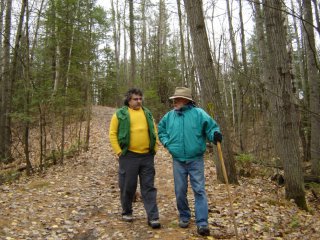He Visits, Occasionally

Not so little now, of course, but as he's my younger brother by some thirteen years, I tend to think of him as my 'little brother'. You would definitely not think 'little' observing him. He's solid, as in thick-framed, stout, a favourite word of our father's which, to him meant well built. My brother, despite that he reminds us at each visit that he plays squash and handball daily, is not what anyone in their right mind could term well built. Fact is, if he keeps going in the stout direction it won't be too much longer before he could be termed morbidly obese. Cripes, he's a vegetarian and you'd think that alone would ensure he wouldn't pack on those pounds, but obviously not.
I was thirteen when he was born and to me fell the manifold tasks involved in looking after a baby, an infant, a young child. Little wonder then, that I wasn't lost at sea after the birth of our own children - having been through it in a sense, earlier, practising my sleeping skills on my little brother. He came in right handy as an infant when my mother forbade me to see my boyfriend any longer, because she didn't care for the reputation his father had in the community. I had protested that it was the son I was interested in, not the father - to no avail. I still saw him though, letting him know where he could find me as I took my little brother for walks in neighbourhood parks and libraries. There they are, pictured above, my little brother seen in yellow and green and my boyfriend, in the bright blue jacket and fedora.
He's a really nice guy is my brother. I don't, of course, know how people who work under him regard him, though. They might very well think otherwise. He's a botanist, a scientist, an environmentalist, and head of the biology department at his university. Since departmental heads have to do a lot of hand-holding, a lot of disciplinary work, he may very well be regarded as other than 'nice'. Sometimes I don't think it's very nice the way I hear him talk about his children. On the other hand, who among us hasn't experienced let-downs and/or disappointment in our children? Works both ways too of course.
We, for example, gave example, never pushed our children really to do anything, although we did anticipate that they would take a healthy interest in life, in the world in which they live, in their futures. Our dinner-table conversations covered just about anything you might imagine from science to politics, to sociology to world affairs, and a whole lot in between. We argued, put forth our cases, considered others' opinions, altered our own, marvelled at the fund of knowledge crammed into young heads, and celebrated parenthood.
Then, when our daughter became, let's see, around sixteen, she no longer wanted to contribute or even be a silent part of dinner table conversations. What we found exciting and liberating, she found oppressive and dull. As well as disturbingly loud. Voices raised in the exuberance of discovery and discussion, insisting on opinions being heard. Her brothers did not share her opinion and our exchanges of opinion and urgent conversations continued. Little did we really know how much our daughter disliked them until years later. But that too is another story.
How did we get here? Well, my brother and his children had rather a difficult time of family life, early family life. Their mother, my brother's first wife, the beautiful Pamela, became so utterly self-absorbed that it was difficult eventually to understand that her problem had been compounded by a troubling mental condition which rendered her effectively childlike in manner, demeanor and intelligence. They've been long separated, and their one-time day-care provider long since took their mother's place. They still talk often with their mother who is now living in another city, under constant medication, and occasionally visit her briefly in the company of their father. For all intents and purposes their step-mother did become their mother in the very real sense of the word, and to her they owe a life of normalcy.
My brother is involved in environmental enterprises, quite outside the parameters of his job, and is a member of many environmental groups which often meet in our city, so when he's here, he often stays with us. As he did last month, for a few days, so we're able to keep in touch. Last year he stopped by with a veterinarian friend who had ties to the university; they were both on their way to the far north. They stayed over with us on the way there, then came along on the way back for another few days' stay. My brother brought back botanical samples with him, and also the skull of a narwhal.
While he's here, he always likes to go out on hikes with us, and sometimes as a result of paucity of time available, or the weather, we're not able to go much further abroad than our very own ravine, which is where we ended up on this visit. It's interesting to stroll in the woods with him, though, since he's able to identify all manner of flora, trees, bushes, wildflowers that we are not, ourselves, able to recognize. And some of them are quite surprising to us. Like the presence of a native holly in the forest of the ravine, who knew?

<< Home